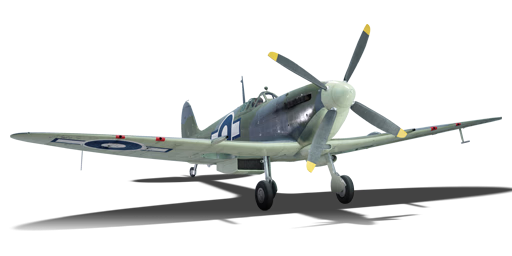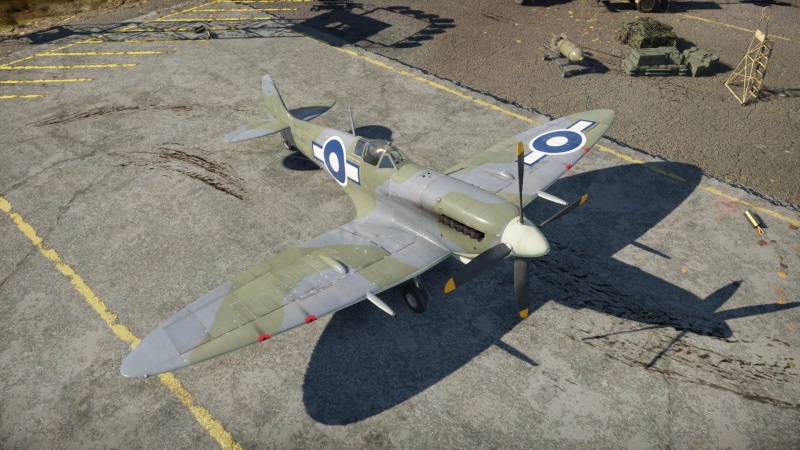Difference between revisions of "Seafire LF Mk.III"
(→Description) |
Jareel_Skaj (talk | contribs) (→Pros and cons: Clarified engine overheating) |
||
| (One intermediate revision by one other user not shown) | |||
| Line 14: | Line 14: | ||
== Description == | == Description == | ||
<!-- ''In the description, the first part should be about the history of and the creation and combat usage of the aircraft, as well as its key features. In the second part, tell the reader about the aircraft in the game. Insert a screenshot of the vehicle, so that if the novice player does not remember the vehicle by name, he will immediately understand what kind of vehicle the article is talking about.'' --> | <!-- ''In the description, the first part should be about the history of and the creation and combat usage of the aircraft, as well as its key features. In the second part, tell the reader about the aircraft in the game. Insert a screenshot of the vehicle, so that if the novice player does not remember the vehicle by name, he will immediately understand what kind of vehicle the article is talking about.'' --> | ||
| − | The '''{{Specs|name}}''' was a British WWII carrier based fighter based on [[Spitfire Mk | + | The '''{{Specs|name}}''' was a British WWII carrier-based fighter based on the [[Spitfire Mk Vc]]. It was the first version of the navalized Spitfire that featured manually folding wings, allowing for easier storage and accommodating of more fighters in the hangar bay and on the deck of an aircraft carrier. A more powerful engine was also installed, namely the Merlin 55 for the F MK III or Merlin 55M for L Mk III. A slim Aero-Vee air filter and six stack ejector type exhausts were fitted to the plane as well. The Mk III was the most produced variant of a Seafire with 1,220 built: 870 by Westland and 350 by Cunliffe Owen. In 1947, 12 Seafire Mk IIIs were stripped of naval equipment such as arresting hooks and handed over to the Irish Air Corps. |
| − | The Seafire was introduced | + | The Seafire was introduced in [[Update "Winged Lions"]]. The Seafire shares main flight characteristics with its brother, the Spitfire Mk Vc, which it was developed from. It is armed with a pair of Hispano Mk.II 20 mm cannons with 120 rpg and four 7.7 mm Browning machine guns with 350 rpg all mounted in the wings. The climb rate and speed of the Mk III is subpar when compared to its contemporary enemies such as the Bf 109 G-6 or Fw-190 A-5. One of the few advantages sporting against these planes is the superb manoeuvrability of the Seafire coupled with great energy retention during manoeuvres. Effectively it could also be called a "jack of all trades, but master of none". |
== General info == | == General info == | ||
| Line 123: | Line 123: | ||
'''Pros:''' | '''Pros:''' | ||
| − | * The engine | + | * The engine doesn't overheat any faster than the engines of the other Spitfires |
'''Cons:''' | '''Cons:''' | ||
Latest revision as of 21:33, 6 November 2024
| This page is about the British fighter Seafire LF Mk.III. For the French Seafire, see Seafire LF Mk.III (France). For other versions, see Spitfire (Family). |
Contents
Description
The Seafire LF Mk.III was a British WWII carrier-based fighter based on the Spitfire Mk Vc. It was the first version of the navalized Spitfire that featured manually folding wings, allowing for easier storage and accommodating of more fighters in the hangar bay and on the deck of an aircraft carrier. A more powerful engine was also installed, namely the Merlin 55 for the F MK III or Merlin 55M for L Mk III. A slim Aero-Vee air filter and six stack ejector type exhausts were fitted to the plane as well. The Mk III was the most produced variant of a Seafire with 1,220 built: 870 by Westland and 350 by Cunliffe Owen. In 1947, 12 Seafire Mk IIIs were stripped of naval equipment such as arresting hooks and handed over to the Irish Air Corps.
The Seafire was introduced in Update "Winged Lions". The Seafire shares main flight characteristics with its brother, the Spitfire Mk Vc, which it was developed from. It is armed with a pair of Hispano Mk.II 20 mm cannons with 120 rpg and four 7.7 mm Browning machine guns with 350 rpg all mounted in the wings. The climb rate and speed of the Mk III is subpar when compared to its contemporary enemies such as the Bf 109 G-6 or Fw-190 A-5. One of the few advantages sporting against these planes is the superb manoeuvrability of the Seafire coupled with great energy retention during manoeuvres. Effectively it could also be called a "jack of all trades, but master of none".
General info
Flight performance
| Characteristics | Max Speed (km/h at 3,963 m) |
Max altitude (metres) |
Turn time (seconds) |
Rate of climb (metres/second) |
Take-off run (metres) | |||
|---|---|---|---|---|---|---|---|---|
| AB | RB | AB | RB | AB | RB | |||
| Stock | 561 | 541 | 10500 | 17.2 | 17.8 | 14.6 | 14.6 | 340 |
| Upgraded | 627 | 592 | 15.7 | 16.2 | 26.9 | 19.5 | ||
Details
| Features | ||||
|---|---|---|---|---|
| Combat flaps | Take-off flaps | Landing flaps | Air brakes | Arrestor gear |
| X | X | ✓ | X | ✓ |
| Limits | ||||||
|---|---|---|---|---|---|---|
| Wings (km/h) | Gear (km/h) | Flaps (km/h) | Max Static G | |||
| Combat | Take-off | Landing | + | - | ||
| 760 | 270 | N/A | N/A | 230 | ~10 | ~5 |
| Optimal velocities (km/h) | |||
|---|---|---|---|
| Ailerons | Rudder | Elevators | Radiator |
| < 321 | < 400 | < 350 | > 500 |
Survivability and armour
The Seafire LF Mk.III has little protection: your enemies' guns will nearly always hit something vital. The pilot is protected in the rear by a 7 mm steel plate covering the seat, but this is not enough to stop 12.7 mm and 20 mm AP rounds, the kind you will most commonly be facing. The pilot is protected from head-ons by a sloped 38 mm pane of bulletproof glass, and a small amount of armour and fuel tanks in the nose.
Modifications and economy
Armaments
Offensive armament
The Seafire LF Mk.III is armed with:
- 2 x 20 mm Hispano Mk.II cannons, wing-mounted (120 rpg = 240 total)
- 4 x 7.7 mm Browning machine guns, wing-mounted (350 rpg = 1,400 total)
Usage in battles
The Seafire LF Mk.III should be played as a turnfighter with a good climb rate. Use the plane's good climb rate to get to around 4,000 m and attack low-flying or otherwise disadvantaged opponents. Attacking bombers is not recommended, as you have little ammunition and your offensive armament is not powerful enough to take out bombers before their defensive armament takes you out. Conserve your energy so you can stay manoeuvrable: it is recommended to build up speed in a straight line after reaching altitude.
Manual Engine Control
| MEC elements | ||||||
|---|---|---|---|---|---|---|
| Mixer | Pitch | Radiator | Supercharger | Turbocharger | ||
| Oil | Water | Type | ||||
| Controllable | Controllable Not auto controlled |
Not controllable Not auto controlled |
Controllable Not auto controlled |
Separate | Not controllable 1 gear |
Not controllable |
Pros and cons
Pros:
- The engine doesn't overheat any faster than the engines of the other Spitfires
Cons:
- Poor mid and high altitude performance
- Slower than nearly all opponents
- Weak armament
- Outperformed by most other fighters at its tier
History
Describe the history of the creation and combat usage of the aircraft in more detail than in the introduction. If the historical reference turns out to be too long, take it to a separate article, taking a link to the article about the vehicle and adding a block "/History" (example: https://wiki.warthunder.com/(Vehicle-name)/History) and add a link to it here using the main template. Be sure to reference text and sources by using <ref></ref>, as well as adding them at the end of the article with <references />. This section may also include the vehicle's dev blog entry (if applicable) and the in-game encyclopedia description (under === In-game description ===, also if applicable).
Media
- Skins
See also
- Related development
External links
Paste links to sources and external resources, such as:
- topic on the official game forum;
- other literature.
| Supermarine | |
|---|---|
| Spitfires | |
| Merlin engine | Spitfire Mk Ia · Spitfire Mk IIa · Spitfire Mk.IIa Venture I · Spitfire Mk IIb |
| Spitfire Mk Vb · Spitfire Mk Vb/trop · Spitfire Mk Vc · Spitfire Mk Vc/trop | |
| Spitfire F Mk IX · Spitfire F Mk IXc · Spitfire F Mk XVI | |
| Spitfire LF Mk IX · Plagis' Spitfire LF Mk IXc | |
| Griffon engine | Spitfire F Mk XIVc · Spitfire F Mk XIVe · Prendergast's Spitfire FR Mk XIVe · Spitfire F Mk XVIIIe · Spitfire F Mk 22 · Spitfire F Mk 24 |
| Export | ▄Spitfire Mk Vb/trop · ▃Spitfire LF Mk IXc · ▂Spitfire Mk IXc · Spitfire Mk IXc · Spitfire Mk.IX (CW) · Weizman's Spitfire LF Mk.IXe · ▄Spitfire FR Mk XIVe |
| Seafires | Seafire LF Mk.III · Seafire F Mk XVII · Seafire FR 47 |
| Export | ▄Seafire LF Mk.III |
| Jet fighters | Attacker FB 1 · Attacker FB.2 · Scimitar F Mk.1 · Swift F.1 · Swift F.7 |
| Hydroplanes | Walrus Mk.I |





